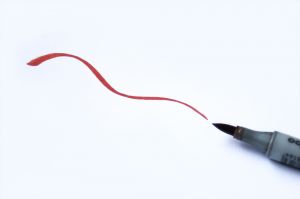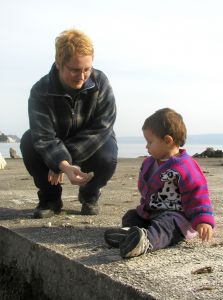By Gaynell Payne
 A part on our dishwasher broke. I spread a towel on the counter and washed the dishes by hand, laying them on the towel to dry. While I was washing, my 23-month-old son wandered in to see what I was doing. Seeing the towel hanging over the counter, the temptation was too much for him. He grabbed the towel and started to pull.
A part on our dishwasher broke. I spread a towel on the counter and washed the dishes by hand, laying them on the towel to dry. While I was washing, my 23-month-old son wandered in to see what I was doing. Seeing the towel hanging over the counter, the temptation was too much for him. He grabbed the towel and started to pull.
“No, don’t pull that,” I said firmly. He fussed and objected, then reached up again. There was a coffee thermos I’d just washed, so I handed it to him to play with instead. He snatched it enthusiastically, but looked back at the towel. He reached up with his free hand and tugged.
“No, you can’t pull on that,” I repeated. He fussed, then pointed to the thermos lid still on the towel. I handed it to him and soon he was happily playing on the floor beside me.
It’s possible that some people would say that my son “won” in this scenario. I didn’t use the opportunity to drive home the word “no” and all of its negative connotations. Instead I distracted him with something else that I knew he liked to play with.
The Classic Power Struggle – Ending in Punishment
Alternate Scenario: My son grabs the towel and starts to pull. “No, don’t pull that,” I say firmly. He looks at me and cries while I continue to wash dishes. In a minute he grabs the towel again, pulling harder. “No!” I yell. “I said, DON’T PULL THAT!” Being yelled at always sends him into a crying tantrum. This time he objects by trying to pull the towel and all of its contents off of the counter. This, in turn, spurs me to have to be even tougher with him to win what I perceive as a power struggle. I have to resort to punishment.
There are several ways parents proceed from here, from spanking to yelling to time-outs. They often involve the eventual domination of the child, and the lesson to him is that he is not the power holder – the parent is.
What is Discipline?
Discipline is teaching a child about the world, and how we conduct ourselves to get along with others in the world. Power struggles are often involved when you are teaching discipline to a child, but they should not be the subject of the teaching. Too often parents get confused, caught up in the struggle. The object lesson then becomes about who is in control. It often ends with the child in tears and the parent claiming an uneasy victory in the lesson, “I hold the power, not you.” Is it any wonder that these lessons end up — by design — making the child feel powerless?
The Classic Power Struggle – Ending in Bribery
Alternate Scenario: My son grabs the towel and starts to pull. “Please don’t pull that,” I say. He looks at me and pouts. He immediately grabs the towel again, pulling harder. “Stop!” I cry, grabbing his hand. He struggles to free himself. “If you stop, I’ll give you this thermos!” I say frantically. “You always like to play with this thermos!” I give him the thermos. He looks at it skeptically and throws it down, reaching for the towel again. “How about a cookie?” I say. “If you stop, I’ll give you a cookie!” That usually gets his cooperation. He lets me pick him up and holds his hand out for the cookie. Then he holds out his other hand, wanting a second cookie. I give it to him because two cookies will keep him occupied longer while I try to finish up real fast and get the towel out of his way. On the way back to the sink, I trip over the rejected thermos.
What is Redirection?
Choices are wonderful things to give children, but there is a distinct difference between redirection and bribery:
- Bribery is an if-then statement: “If you stop pulling on the towel, then I’ll give you this toy to play with.” This statement gives the child too much power. It tells the child he has the choice to continue to do something that you do not wish. It implies that you are desperate and begging for him to choose to stop. This continues the uneven power course in giving him all the power and you little or none.
- Legitimate choices are given on an even basis, without taking authority away from the parent: “Which DVD do you want to watch: Movie A or Movie B?” “Do you want to wear the red shirt or the blue shirt?” I suggest that any parent should look for opportunities to let their child make choices as often as possible. It’s their life, and they should feel as if their input matters. When they are validated in this way on a regular basis, it is easier for them to accept “no” when it’s necessary.
Was My Son Trying to Dominate Me?
To understand what’s going on, we have to get a little analytical about the situation. Once we understand the whys, it will be easier to judge how to handle it.
Why did my son pull on the towel? Because toddlers have a very strong need to explore their world. It is a pre-programmed drive that urges them to get out there and learn. As adults, we have been there and back and don’t see what the big deal is. It’s obvious to us what will happen if you pull on a towel that is loaded with dishes. Sometimes we forget that it’s not so obvious to them. We perceive their actions as if it they were adults and their actions are purposeful attempts to make a mess. Some would even go so far as to think that the child was making mischief just to provoke them or make their life harder, like some form of revenge or passive-aggressive behavior. Manipulative is a word often mistakenly associated with young children. It is sad because it invalidates the true and innocent need for a child to get a handle on the world around him.
There is a term in psychology called projecting. It’s very much like it sounds. When a person has unhealthy feelings about themselves, they expect that others have these feelings about them, too. They then project them onto someone else, even when that someone else is not really feeling that way.
It’s often the young child that gets to be the screen that the parent’s unresolved issues are projected onto. Young children, even after they’ve learned to talk, are so often unable to articulate their feelings or control their emotions. This allows ample opportunity for an insecure person to see things in their children that aren’t there. For example, instead of seeing that the child has a healthy drive to explore, their willfulness can be perceived as insolence or a lack of respect. This taps into the parent’s insecurities that say they are not good enough to be respected. This may be doubly hard to hear (though it’s not actually being said) coming from a child — their own child no less! So the parent comes down harder. They must get respect out of that child, whatever the cost.
Meanwhile the child is getting another message altogether. They are getting the message that their needs are bad, and their efforts to get those needs met will not be respected. They will be punished. They are also getting the message that they are not good enough to be respected, and that they are only an insignificant child.
Is it any wonder that a child whose parents perpetuate this power struggle, over time comes to believe that he isn’t good enough and not respectable? In the future, if he doesn’t deal with those feelings of insecurity, he may come to have a child and find their curiosity a reflection of his parents’ lack of respect for him. And so the tragic cycle continues.
The Lesson
It’s the winding path of parenthood that often makes us forget the real lesson we were trying to teach in each situation. In fact, like most parents, I hardly ever reflect on the practicality of each event in that way. But it’s important sometimes to come back to it, if only to get our bearings.
So what was the lesson? In other words, why did I say “no” to my son? In this instance, it was because pulling the towel down would have undesirable consequences. But, you may object, he did not learn that. No, he didn’t and he won’t for a while. The only way to teach him that lesson would have been to let him pull it on his head, possibly causing injury to himself, and making a lot of work for me. I trust in the course of time and more gentle experiments that he will learn the cause and effect of actions such as this. Since I was unable to help him learn what he was curious about, I still recognized his attempts as part of the base need to explore and learn. So I made a substitution. I gave him the thermos, because I knew he was curious about that also. He had been exploring it in the past few days; imitating Daddy and pretending to drink out of it. It was neither bribery nor dismissal; it was redirection.
Instead of dismissing my child’s actions, I tried to hear what he was saying to me. In this case, it was, “I want to learn. I need to explore.” Because I listened to him, he listened to me when I said “no.” Even after he was finished playing with the thermos, he didn’t try to pull the towel down again. As a mom, I consider that successful discipline.
 You hear a loud thud, an ear-piercing scream, and then your child appears before you wearing a tear-stained cheek and red eyes and is pointing to another child. Apparently, your son was hit by another parent’s daughter in the playgroup and you are wondering what to do. The mother is busy chatting away to another parent and is missing the whole scenario. What is the best way to handle playgroup altercations that leaves everyone feeling content and supported?
You hear a loud thud, an ear-piercing scream, and then your child appears before you wearing a tear-stained cheek and red eyes and is pointing to another child. Apparently, your son was hit by another parent’s daughter in the playgroup and you are wondering what to do. The mother is busy chatting away to another parent and is missing the whole scenario. What is the best way to handle playgroup altercations that leaves everyone feeling content and supported?
 “Grant me the serenity to accept the things I cannot change; courage to change the things I can; and wisdom to know the difference.”
“Grant me the serenity to accept the things I cannot change; courage to change the things I can; and wisdom to know the difference.” A part on our dishwasher broke. I spread a towel on the counter and washed the dishes by hand, laying them on the towel to dry. While I was washing, my 23-month-old son wandered in to see what I was doing. Seeing the towel hanging over the counter, the temptation was too much for him. He grabbed the towel and started to pull.
A part on our dishwasher broke. I spread a towel on the counter and washed the dishes by hand, laying them on the towel to dry. While I was washing, my 23-month-old son wandered in to see what I was doing. Seeing the towel hanging over the counter, the temptation was too much for him. He grabbed the towel and started to pull. Has your teenager stopped listening to you? Do you routinely catch him telling lies, or does she continually break curfew? You may be finding yourself tempted to make tighter rules and to pass out punishments when these rules are broken. But Christina Botto, author of Help Me with My Teenager!, says this strategy is likely to backfire.
Has your teenager stopped listening to you? Do you routinely catch him telling lies, or does she continually break curfew? You may be finding yourself tempted to make tighter rules and to pass out punishments when these rules are broken. But Christina Botto, author of Help Me with My Teenager!, says this strategy is likely to backfire. “Today at our play group my son bit my friend’s daughter! My friend acted like it was a normal childhood problem, and told me not to worry about it, but I’m horrified! Why did my son do this? How can I prevent it from happening again?”
“Today at our play group my son bit my friend’s daughter! My friend acted like it was a normal childhood problem, and told me not to worry about it, but I’m horrified! Why did my son do this? How can I prevent it from happening again?” When I was younger, my mother would take my sister and I to browse through little shops in our hometown full of local artisan’s crafts. She never bought anything; she just liked to look. On one of the trips when I was about eight years old, I spied a replica of a U.S. quarter about the size of a saucer and I just had to have it. I didn’t have any money with me, and when I asked my mom if she could buy it for me, she said no. So, when no one was looking, I put it in my coat pocket.
When I was younger, my mother would take my sister and I to browse through little shops in our hometown full of local artisan’s crafts. She never bought anything; she just liked to look. On one of the trips when I was about eight years old, I spied a replica of a U.S. quarter about the size of a saucer and I just had to have it. I didn’t have any money with me, and when I asked my mom if she could buy it for me, she said no. So, when no one was looking, I put it in my coat pocket. Through Attachment Parenting, we learn how truly powerful a close emotional relationship with our children can be. But even with the strongest of bonds, conflict will arise between parents and their children. As children grow, AP focuses more and more on how we, as parents, resolve conflict — in a gentle, positive manner that promotes influence, guidance, and teaching rather than control.
Through Attachment Parenting, we learn how truly powerful a close emotional relationship with our children can be. But even with the strongest of bonds, conflict will arise between parents and their children. As children grow, AP focuses more and more on how we, as parents, resolve conflict — in a gentle, positive manner that promotes influence, guidance, and teaching rather than control. The Public News Service published an article featuring API Co-founder Lysa Parker’s perspective on U.S. President Barack and First Lady Michelle Obama’s family values.
The Public News Service published an article featuring API Co-founder Lysa Parker’s perspective on U.S. President Barack and First Lady Michelle Obama’s family values.